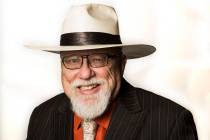Basking briefly in legend’s brilliance
The surgical mask and cap that Dr. Denton Cooley wore always directed your attention to his green eyes. On that day in 2002 the then 83-year-old surgeon - who astounded the world in 1969 when he was the first surgeon to successfully implant a totally artificial heart in a human being ---- was about to operate on an Arkansas welder, a heart-valve replacement so complicated no surgeon in his native state would try it.
"This will be a difficult procedure, but we're up to it," the 6-foot-4-inch Cooley said, winking as he walked out of his Texas Heart Institute office toward the St. Luke's Episcopal Hospital operating room in Houston. "You have to remember, I got my first hole-in-one the other day after only 66 years of playing golf, so I've got to figure I'm on a roll."
It happens to me often during the holidays, going down memory lane, remembering people who made an indelible impression on me and then calling them on the phone. My conversation the other day with the now 93-year-old Cooley wasn't as long as our talks at St. Luke's. When I headed communications there I often found an excuse to stop by his office. But our talk was long enough to remember you just never know who the people are who will help make you what you should be, or where they'll come from.
Cooley, who left the operating room and his 15-hour days at age 87, stepped up his writing afterward. His 13th book, which came out earlier this year, "100,000 hearts: A Surgeon's Memoir," takes its name from the 100,000 heart procedures he and his surgical team carried out in the 50 years since the Texas Heart Institute opened at St. Luke's in 1962.
The more you think about whom Cooley credits for his surgical technique ---- a technician with a high school diploma - the more it becomes both an incredibly wonderful, and sad, American story.
Remember, this is a man who's arguably the greatest heart surgeon who ever lived, who developed new ways to repair aneurysms, performed the first heart-lung transplant in a baby, who developed 200 cardiovascular products.
Dr. Christian Barnard, the South African surgeon who performed the world's first heart transplant ---- Cooley did the first successful one in the U.S. ---- was in awe of Cooley's technique. In his book "One Life," he wrote: "It was the most beautiful surgery I had ever seen. ... Whereas most surgeons would have taken three hours, he could do the same operation in one hour. ... Every movement had a purpose and achieved its aim."
So who does Cooley, awarded both the National Medal of Freedom, the nation's highest civilian award, and the National Medal of Technology, credit for developing a technique that saved the lives of thousands, including the Arkansas welder?
Vivien Thomas, a financially strapped black high school graduate who rose above racism to devise surgical techniques as a technician at Johns Hopkins University.
One of Thomas' techniques led to the operation to save "blue babies," infants born with a heart defect that sends blood past their lungs, resulting in oxygen deprivation that causes the infant's bluish color.
"Simplicity, that's what I took from Vivien," Cooley says of the man who never got the chance to become a physician but finally received credit for his brilliance in the documentary, "Partners of the Heart," and the HBO movie, "Something the Lord Made." He also received an honorary doctorate from Johns Hopkins and an appointment to the medical school faculty.
"There wasn't a false move, not a wasted motion, when he (Vivien) operated," Cooley recalls.
Cooley, who was an intern when the first blue baby operation took place in 1944, watched as Thomas stood on a stool above the right shoulder of Dr. Alfred Blalock, coaching every move as Blalock rebuilt a little girl's heart.
"You see," Dr. Cooley says, "it was Vivien who had worked it all out in the lab in the canine heart, long before Dr. Blalock did Eileen, the first blue baby. ... Vivien could use his hands so gracefully."
So it goes in America.
Contact reporter Paul Harasim at
pharasim@reviewjournal.com or 702-387-2908.












